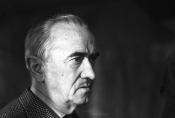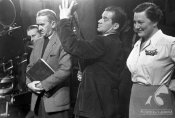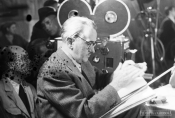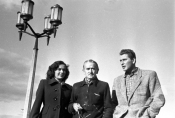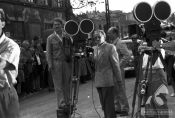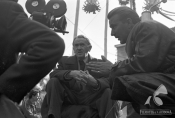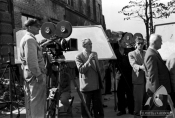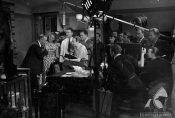Leonard Buczkowski
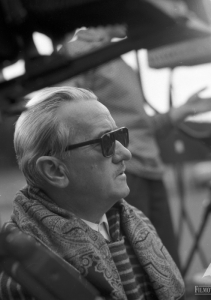
Film director, screenwriter and actor. He was born on August 5, 1900 in Warsaw; he died on February 19, 1967 in Warsaw. In 1918, during the First World War, he fought as a pilot. He studied acting at the Stanisława Wysocka Dramatic Film Studio and the Wiktor Biegański Film Institute (1920-1922). As an actor, he starred in several silent films, including Na jasnym brzegu /On the Bright Shore (1921) directed by Edward Puchalski, Kule, które nie trafiają /Bullets That Miss (1923) and Awantury miłosne panny D./ Love Affairs of Miss D. (1923) by Tadeusz Chrzanowski.
Before he made his debut in 1928 as independent director of the silent film Szaleńcy/Madmen (alternative title: My, Pierwsza Brygada/We, the First Brigade; version with sound released in 1934), for which he received the Gold Medal at the World Exhibition in Paris (1929); he was assistant to Wiktor Biegański, working on films such as Orlę/Eagling (1927). One of his most important pre-war works is the film adaptation of “Faithful River” (1936) by Stefan Żeromski. During World War II, he was in Hungary, then in Warsaw, where he filmed several commercials for private German companies; this is why he had to release one of his best post-war films Skarb/Treasure (1948) under the pseudonym of “Marian Leonard”. In 1945, he shot the documentary Łódź 1939-1945, dedicated to the memory of the victims of Nazi terror.
He directed Zakazane piosenki/Forbidden Songs (1946, premiere in 1947) – the first Polish feature film produced after the war, and Przygoda na Mariensztacie/Adventure in Marienstadt (1953) – the first Polish cinema feature film in colour. He was a reliable, versatile craftsman of cinema, comfortable in different genres: comedies – Skarb/Treasure (1948) or Marysia i Napoleon/Mary and Napoleon (1966, award in Barcelona), opera classics – Straszny dwór/The Haunted Mansion (1936), and popular literature adaptations – Florian (1938) based on the novel by Maria Rodziewiczówna, Biały murzyn /White Negro (1939), based on the novel by Michał Bałucki. He also made several air-force themed films – Gwiaździsta eskadra /The Starry Squadron (1930), Pierwszy start/The First Take-Off (1950), Sprawa pilota Maresza /The Case of Pilot Maresz (1955 Golden Duck); he was also interested in the navy – Rapsodia Bałtyku /Rhapsody of the Baltic Sea (1935), Orzeł/The Eagle (1958).
He was awarded the Gold Cross of Merit (1954).
Jerzy Armata
Selected filmography
-
1946
FORBIDDEN SONGS
-
1948
THE TREASURE
-
1953
AN ADVENTURE AT MARIENSZTAT

